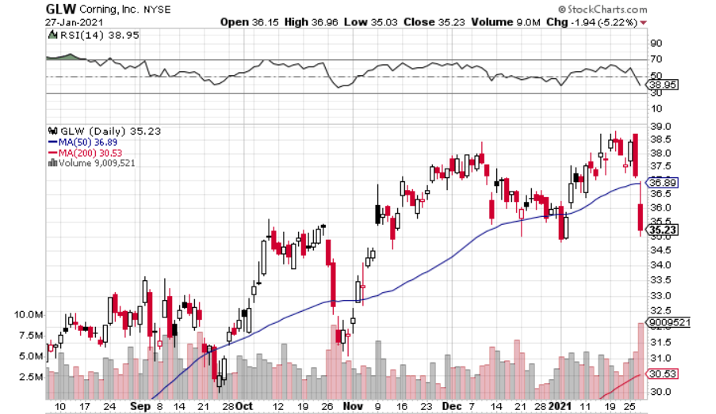Corning (NYSE: GLW) extended its streak of daily increases to 11 yesterday, breaking above $30 a share before closing just under that level.
Last week, in the midst of that streak, JP Morgan NYSE: JPM upgraded Corning from Neutral to Overweight. Its price target was raised from $25 to $36.
Analyst Samik Chatterjee believes Corning will beat expectations for its display segment, which manufactures glass for televisions and computers, in Q2 and Q3. Chatterjee also sees growth in Corning’s other four segments.
While Chatterjee is optimistic about Corning’s future, the company is coming off a tough quarter.
Few Bright Spots in Q1 2020
Q1 2020 sales were around $2.5 billion for Corning and net income was $177 million. Here are the Q1 revenue numbers for each of the five segments:
- Display Technologies sales were $751 million, down 8.2% yoy.
- Optical Communications revenue came in at $791 million, down 25.7% yoy.
- Environmental Technologies sales were $320 million, down 12% yoy.
- Specialty Materials revenue was $352 million, up 14% yoy.
- Life Sciences revenue was $258 million, up 6% yoy.
These numbers raise concerns, especially considering the weak performance of Display Technologies and Optical Communications, which account for more than 60% of Corning’s revenue. And while Specialty Materials and Life Sciences performed well, they only combine for around a quarter of Corning’s revenue.
The pandemic hurt sales as site access, health, and safety concerns, and supply chain disruptions compromised Corning’s business. Stay-at-home orders hurt end-user demand, with car and smartphone sales declining late in Q1.
Most of Corning’s businesses have high fixed costs, so even though the company has decreased production due to the lower demand, it hasn’t been able to reduce its costs by a corresponding amount. Q1 gross margin came in at 33.4%, below Corning’s expectations.
But There is Good News
According to Counterpoint, after a weak April in which smartphone sales were down 50% yoy, June sales were higher than June 2019. The virus shifted business to the internet, with e-commerce transactions accounting for 31% of phones sold in Q2 compared to 14% in Q2 2019.
A lot of people put off previously planned upgrades in March and April due to store closures and uncertain economic situations. These effects are now lessening, and demand should continue to recover. And in the long run, 5G and the trend towards larger screens provide tailwinds to Corning’s Optical Communications and Specialty Materials segments.
Shifting gears to the Environmental Technologies business, which manufactures ceramic substrates and filter products for emissions control in mobile, gasoline, and diesel applications, Corning’s sales have suffered due to decreasing global car sales.
Sales may be light for the rest of the year, but traffic has already returned to pre-pandemic levels. While that doesn’t mean people are rushing to buy new cars, it is a sign that the pandemic is not keeping people off the roads. This could indicate that car sales won’t be as bad as previously feared in Q2, Q3, and Q4.
Is the Price Right?
Corning is trading at around 27.5x projected 2020 earnings and around 17.5x projected 2021 earnings, reflecting its current struggles but expected recovery in 2021.
The company pays a dividend of just under 3%, solid in this low-yield environment. It still expects to generate positive free cash flow this year, so the dividend doesn’t appear to be in jeopardy.
Corning has actually issued debt with 30, 50, and 60-year maturities. Its average debt maturity of around 25 years is the longest in the S&P 500.
The company does have nearly $8 billion in long-term debt, but the obligations are spread out and there is no single year with more than $500 million of debt repayments due. Corning’s $2 billion in cash and consistent cash flow should allow it to easily satisfy its obligations.
The bottom line, Corning looks like a good long-term play. It is positioned to weather the current storm, and moderate growth is possible in 2021 and beyond.

Where Can You Get In?
Corning has a good-looking chart with a clear up-trend. The 50-day moving average is about to cross over the 200-day moving average.
But now is not the time to get in. The aforementioned 11-session winning streak has sent shares into overbought territory on the RSI. The stock is extended from its 50-day and 200-day moving averages. And shares are now brushing against a lot of resistance from late last year, around $30 a share.
I’d look for one of these two scenarios before getting in:
- A pullback to the 50-day / 200-day moving average (which should remain close for some time).
- A consolidation around $30 for a few weeks, followed by a powerful breakout above $31.
The Final Word
Corning isn’t the type of company that is going to put together 3-5 straight years with double-digit revenue growth. But it is a strong company that is just dealing with temporary setbacks; it should recover quickly.
If the chart shapes up and you can pick up some shares, you may get a nice payoff over the next year or two.
Before you make your next trade, you'll want to hear this.
MarketBeat keeps track of Wall Street's top-rated and best performing research analysts and the stocks they recommend to their clients on a daily basis.
Our team has identified the five stocks that top analysts are quietly whispering to their clients to buy now before the broader market catches on... and none of the big name stocks were on the list.
They believe these five stocks are the five best companies for investors to buy now...
See The Five Stocks Here
Enter your email address and we'll send you MarketBeat's list of seven best retirement stocks and why they should be in your portfolio.
Get This Free Report